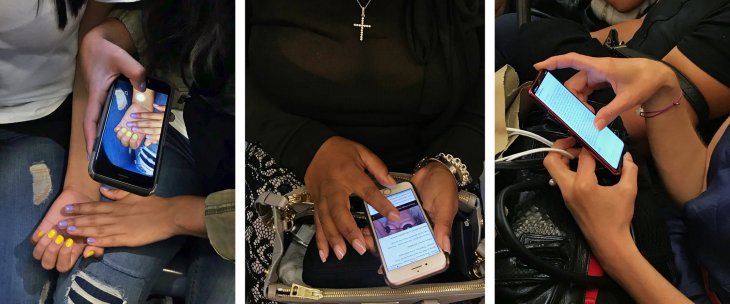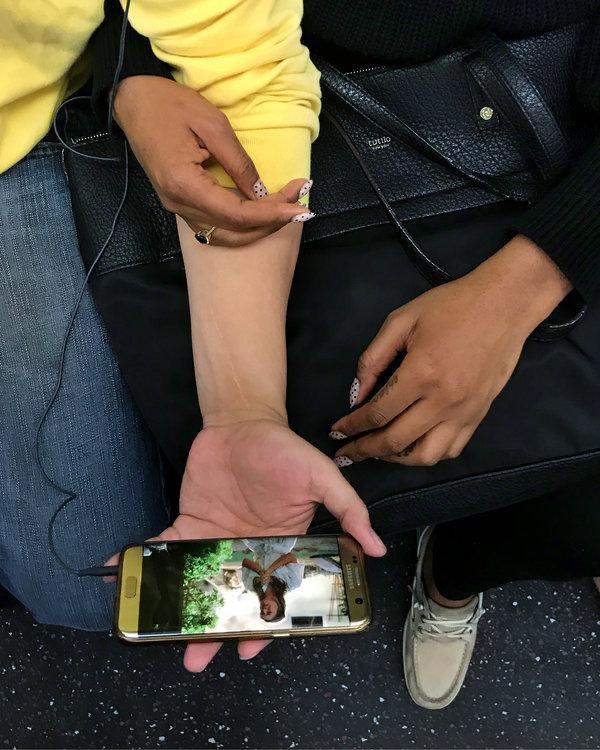This Is Why You Keep Looking At Other People's Phone Screens
Dhir Acharya - Apr 04, 2019

As screens are everywhere these days, it's a fact that we are looking at other people's screens more, too. That's called shoulder surfing.
- How to get a Bangladesh virtual phone number?
- Looking For The Best Non Chinese Smartphone? Check Out This List
- Xiaomi Mi 10i: Made In India, Snapdragon 750G Chip, 5G, 120Hz Display, 4,820mAh Battery, And 108MP Camera
Just stop for a moment and take a look around, people’s screens are everywhere. You can literally see screens anywhere you go, while waiting for your coffee, on a bus, on a train, during a live concert, on the street, etc. People view all aspects of life through their screens, and their dependence on it has increased over the years.
Screens have not only changed the way we live and interact, but they have also changed how we define “shoulder surfing,” previously known as peeking over shoulders, usually with malicious intent. Almost three decades ago, someone might try to do that to steal your credentials, like passwords, which is why they show up as dots when you type.

But now, while it’s impossible to ignore people’s screens, there weren’t any detailed investigations into shoulder surfing incidents as well as their implications in the real world. So a Germany-based research team did. Survey results by this team show that “shoulder surfing was mostly casual and opportunistic,” mostly occurs among strangers, in public transport, and involves smartphones. Notably, the survey reveals why we can’t help looking at other people’s screens.
Other people’s screens are glimpses of an archive. On the subway or train, we can hardly access to the Internet, so shoulder-surfing people’s screens is a way to kill time and even get entertained with Candy Crush, reading in-app, books or magazines, television, etc.
Other people’s screens are works in progress. We can also spot unfinished texts that people edit over and over again so they can send at the next stop of the subway. In some cases, we can watch people touching up their photos (especially selfies), or their group chats filled with religious affirmations, their work emails talking about clients because now we can work anywhere not just at the office.

Other people’s screens are sources of recommendations. Nah, you don’t ask people what they are reading and whether they are enjoying it or not, you just “surf” to get clues. It looks like a lot of people watch more action movies than your previous expectation, you can also see interesting TV shows, not that you know the shows’ names or what’s going on in them. However, while you may have a good time shoulder surfing those contents, it’s extremely hard to Google them when you can only give a limited, puzzled, confusing description based on what you see and remember. Shoulder surfing also suggests that WhatsApp is quite a popular messaging platform right now, there goes another recommendation for you if you are not familiar with this app.
Other people’s screens have rear cameras and sometimes go viral. In 2018, a tweet about shoulder surfing received more than 51 retweets. The viral tweet included several photos of a man that was apparently and persistently looking at other people’s screens.

In 2017, a man went viral for shoulder surfing
Other people’s screens are a brief historical aberration. Nowadays, phones can unlock by scanning users’ faces and are able to tell whether users are smiling or not. So it’s not a surprise when they can let users know when others are watching, on a train or somewhere else.
However, because screens also serve as a source of raw content to go on the Internet, shoulder surfing and watch other people’s screens is not only privacy evasion but also a form of theft. And while one mostly unintentionally look at other people’s screens, both observers and users expressed negative feelings including embarrassment, anger, guilt, or unease. No one likes the idea that their screens are being watched by others. According to the survey, among 37 cases, only one respondent reported positive feelings; the others felt like they were harassed or spied on.
All in all, looking at other people’s screens seem inevitable these days. But whatever you do, try to behave in public and avoid shoulder surfing as much as you can.
Featured Stories

Features - Jan 29, 2026
Permanently Deleting Your Instagram Account: A Complete Step-by-Step Tutorial

Features - Jul 01, 2025
What Are The Fastest Passenger Vehicles Ever Created?

Features - Jun 25, 2025
Japan Hydrogen Breakthrough: Scientists Crack the Clean Energy Code with...

ICT News - Jun 25, 2025
AI Intimidation Tactics: CEOs Turn Flawed Technology Into Employee Fear Machine

Review - Jun 25, 2025
Windows 11 Problems: Is Microsoft's "Best" OS Actually Getting Worse?

Features - Jun 22, 2025
Telegram Founder Pavel Durov Plans to Split $14 Billion Fortune Among 106 Children

ICT News - Jun 22, 2025
Neuralink Telepathy Chip Enables Quadriplegic Rob Greiner to Control Games with...

Features - Jun 21, 2025
This Over $100 Bottle Has Nothing But Fresh Air Inside

Features - Jun 18, 2025
Best Mobile VPN Apps for Gaming 2025: Complete Guide

Features - Jun 18, 2025
A Math Formula Tells Us How Long Everything Will Live
Read more

ICT News- Mar 01, 2026
Samsung Links Galaxy S26 Price Hikes to AI Memory Supply Issues
This development highlights the broader challenges faced by the tech industry as it integrates artificial intelligence into everyday consumer electronics.

ICT News- Mar 02, 2026
IDC Report Predicts Surging Smartphone Prices Due to Global RAM Shortage
This development underscores the broader ripple effects of the AI boom on everyday technology, highlighting the interconnected nature of global semiconductor supply chains.

ICT News- Feb 28, 2026
Anthropic Blacklisted by US Department of War: Trump Orders Federal Ban Over AI Safeguards Dispute
The story is developing. Federal agencies have been instructed to begin transition planning immediately.
Comments
Sort by Newest | Popular